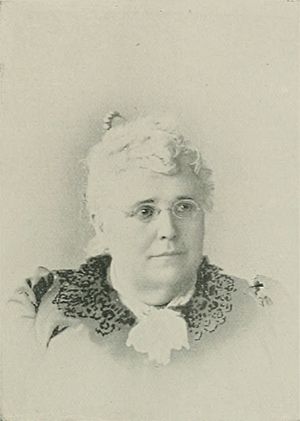Rosa Miller Avery facts for kids
Quick facts for kids
Rosa Miller Avery
|
|
|---|---|

"A Woman of the Century"
|
|
| Born | Rosa Mary Miller May 21, 1830 Madison, Ohio, U.S. |
| Died | November 9, 1894 Chicago, Illinois, U.S. |
| Pen name |
|
| Occupation |
|
| Language | English |
| Nationality | American |
| Spouse |
Cyrus Avery
(m. 1853) |
| Relatives | Rachel Foster Avery (daughter-in-law) |
Rosa Miller Avery (born Rosa Mary Miller; May 21, 1830 – November 9, 1894) was an American writer and activist. She worked to end slavery and fought for women's right to vote. She also worked to improve society. She sometimes used the pen name "Sue Smith" or other male names for her writings.
Rosa's childhood home was a secret stop on the "Underground Railroad". This was a network that helped enslaved people escape to freedom. As an adult, she started the first anti-slavery group in Ashtabula, Ohio. During the American Civil War, she wrote many articles. She wrote about keeping the country united and ending slavery. She often had to use a male name so people would pay attention to her ideas.
Later, she wrote about women's right to vote. Many of her articles appeared in the Chicago Inter-Ocean newspaper. Her later writings, signed "Sue Smith," focused on social issues and advice for young people. After moving to Chicago, she continued her work for social purity and equal rights for women.
Early Life and Family
Rosa Mary Miller was born in Madison, Ohio, on May 21, 1830. Her family had roots in Scotland and England. Her grandfather, Captain Isaac Miller, fought in the American Revolutionary War. He was hurt at the Battle of Bunker Hill. Another relative, General James Miller, worked for General George Washington.
Her father, Nahum Miller, was an early supporter of ending slavery. Their family farm was known for welcoming anyone who needed help. Rosa loved animals and was even called "Tomboy" because she spent so much time with the farm animals. She inherited her love for animals from her mother's father, James McDonald. Rosa enjoyed cattle shows and horse fairs.
Her father, Nahum Miller, was one of the first settlers in the Madison area of Lake County, Ohio. He built his home in the woods and created a farm. He loved to read about history and had kind views about people. He also adopted two children, in addition to his own five.
Rosa's mother, Esther McDaniels (or McDonald), was an early settler of Ashtabula County, Ohio. Esther believed that laws about property and children were unfair to women. Rosa remembered her mother's words. She said her mother inspired her to work for women's progress.
While at Madison seminary, Rosa wrote strong essays against slavery. Some students made fun of her for these writings. However, two students told her that her anti-slavery papers changed their minds. They decided to study law and politics instead of religion.
Rosa's Work and Activism
On September 1, 1853, Rosa married Cyrus Avery. He was from Oberlin, Ohio. While living in Ashtabula, Ohio, Rosa started the first anti-slavery group in that town. Even two years before the American Civil War, no local church would announce their meetings. This was surprising because the area was home to strong anti-slavery leaders like Joshua Reed Giddings and Benjamin Wade.
Wealthy and important men in the town were upset that the churches would not support Rosa's efforts. They decided to leave their churches. They then built a new church for people who supported ending slavery.
During the Civil War, Rosa Avery wrote a lot for different newspapers. She wrote about keeping the country together and freeing enslaved people. She used male pseudonyms (fake names) to make sure her writings were taken seriously. Her letters and articles caught the attention of important people. These included Governor Richard Yates of Illinois, James A. Garfield, James Redpath, and Lydia Maria Child. They all sent her letters and their pictures to thank her.
"The men and women of to-day who are in earnest for woman's political emancipation stand on Mt. Sinai and make covenant with heaven for the speedy union of spiritual or woman's kingdom to man's or the material world." (Rosa Miller Avery, "Interior View of the Suffrage Question," New Era, 1 June 1885, p. 177.)
Rosa lived in Erie, Pennsylvania, for ten years. During this time, she wrote articles for newspapers. She also shared her ideas on social issues, love, marriage, and religion. She wrote stories for high school graduates in their newspaper, the High School News. She used the pen-name "Sue Smith" for these writings.
Her husband, Cyrus, worked for the Young Men's Christian Association of Erie. He visited criminals in the city prison. Rosa helped him with this work. She became interested in why people commit crimes. She believed that behind every crime, there was a bigger problem that affected everyone.
Later Life and Legacy
Rosa's son, Cyrus, married Rachel Foster Avery. Rachel was also a well-known suffragist, fighting for women's right to vote.
Rosa and her husband moved to Chicago in 1877. Their home, "Rose Cottage," was in Edgewater, a Chicago suburb. It faced Lake Michigan.
In Chicago, Rosa Avery focused on social purity and women's suffrage. She wrote many articles for the Chicago newspapers. She also wrote replies to people who were against women voting. These articles appeared in the Chicago Inter-Ocean under her own name.
At an event celebrating the Statue of Liberty, Rosa was asked to speak about "Liberty." She said that the idea of freedom for women was so strong that even statues were taking the form of women to declare "Liberty Enlightening the World."
Rosa Miller Avery passed away on November 9, 1894, in Chicago.
 | George Robert Carruthers |
 | Patricia Bath |
 | Jan Ernst Matzeliger |
 | Alexander Miles |

